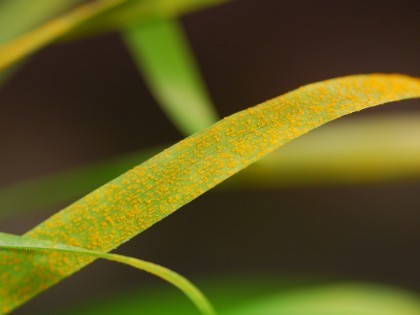
Conducted on AHDB Recommended Lists (RL) varieties, including candidates, the latest screens found that over half of the varieties tested were resistant at the young-plant stage.
Growers should use the information, alongside the RL (adult plant) disease resistance ratings, to adapt spray programmes in 2022, particularly at the T0 spray timing.
Dr Charlotte Nellist, UKCPVS project lead at NIAB, said: “The pathogen that causes yellow rust is complex; some varieties are susceptible to the disease when plants are young but go on to develop some level of resistance after early stem extension. However, if young plants are susceptible and the RL disease resistance rating is also low, crops will require closer monitoring for active rust over the winter period.”
The screens use five pathogen isolates selected by UKCPVS to best represent the diversity in the yellow rust population at the time of testing. A variety is classified as susceptible at the young-plant stage if it is sufficiently susceptible to any one of the isolates.
Charlotte said: “The 2010s saw large changes in the UK yellow rust population, resulting in numerous reductions in resistance, at both the young-plant and adult-plant stages. For example, only three varieties were recorded as having young-plant stage resistance in 2016. Since then, the situation has improved somewhat, with over half of the varieties screened in 2021 classed as resistant during these early growth stages.”
Relatively few yellow rust samples were received by the UKCPVS team in 2021, with 155 samples sent in (from 54 varieties and 19 counties) – around half the number recorded in 2020. The reduction is probably due to this year’s cool, dry spring, which helped reduce wheat yellow rust pressure. Similarly, for brown rust, only 10 samples were received.
Charlotte said: “It is important to send in material, irrespective of the disease pressure. It helps us provide a regional snapshot of the pathogen population and serves as a basis for early warnings of population change. While we cannot test every sample, we do preserve and archive all isolates, which provides an essential reference library for pathogen virulence research.”
The latest cereal pathogen developments, both in the UK and globally, will be in focus at the annual UKCPVS stakeholder meeting on 2 March 2022 at NIAB.
UKCPVS thanks everyone who submitted samples and looks forward to continued support in 2022.
About UKCPVS
Funded by AHDB and APHA, and managed by NIAB in Cambridge, the UK Cereal Pathogen Virulence Survey (UKCPVS) has been monitoring cereal rusts and mildews in the UK for more than 50 years. It provides an early warning system to growers and plant breeders of new races of disease that could overcome current variety resistance, and underpins the AHDB Recommended List disease resistance ratings.

